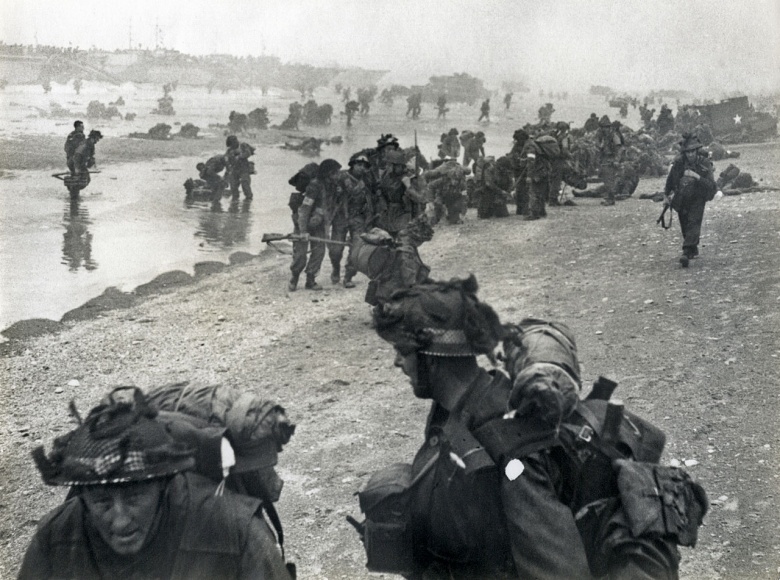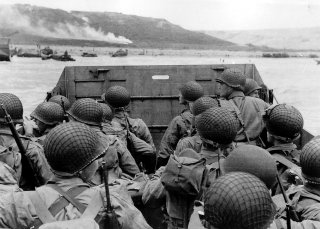The Strategic Wisdom Behind D-Day’s Success
On the 80th anniversary of D-Day, strategic theory by Carl von Clausewitz is revisited, highlighting the crucial decision-making process behind launching new combat theaters, such as the Normandy invasion.
Whether, when, and how to open a new combat theater or line of operations ranks among the most freighted decisions military commanders and their political overseers can ever make. Today, of course, marks the eightieth anniversary of D-Day, the Allied landings in German-occupied Normandy. There is no shortage of tales of valor and sorrow out there to commemorate the day, and I would not presume to add to them. Instead let’s revisit the June 6 assault on Fortress Europe through the prism of strategic theory.

Strategic grandmaster Carl von Clausewitz beseeches military and political leaders to ask themselves three hard questions before vaulting forces into a new theater like World War II France. Clausewitz deliberately sets the bar high for such a decision. He regarded strategy as a process of setting and enforcing priorities, his logic being that no combatant society boasts enough diplomatic, economic and industrial, and military resources to accomplish all worthy goals it espies. A combatant that tries to achieve everything, everywhere, ends up achieving little, anywhere. It dilutes its strength among multiple commitments, leaving itself weaker than antagonists at every point of impact on the map or nautical chart.
Trying to do it all courts extreme peril.
For the sage of Prussia, then, it’s best to decide what matters most and husband manpower and firepower to obtain it. As a corollary the leadership should abjure secondary endeavors except on a not-to-interfere basis with attaining the primary goal. It makes no sense to forfeit what matters most for the sake of something that matters less. That’s why he fashioned what I’ve taken to calling his “Three Rs” to guide decisionmaking vis-à-vis new theaters or efforts.
Namely reward, resources, and risk.
Again, Clausewitz counsels military magnates to concentrate on one big thing rather than trying to do it all. Striking repeatedly and relentlessly at whatever lends cohesion to the foe’s army, government, or society blazes the surest route to triumph at arms. Still, he does grudgingly allow that extraordinary circumstances could warrant extraordinary measures. Siphoning resources from the main theater could be worthwhile, he concedes, “when secondary operations look exceptionally rewarding. But we must repeat that only decisive superiority can justify diverting strength without risking too much in the principal theater” (his emphasis).
So there’s your trusty Clausewitzian guide to thinking through weighty decisions such as whether to mount an amphibious invasion of France. The more abundant the resources, the lower the risk—and the easier it is to give the order setting in motion a promising new enterprise.
In that strategic sense Allied leaders’ decision to proceed with Operation Overlord was easy in mid-1944. After all, American industry had fully geared up by then and was turning out mountains of war matériel—easing the military poverty Clausewitz saw in his own lifetime. Material plenty allowed the Allies to open the new theater at the same time fighting raged in Italy, and at the same time U.S. Army, Navy, and Marine forces were lumbering across the Pacific toward imperial Japan. Indeed, U.S. forces staged amphibious landings on the island of Saipan—an operation of magnitude comparable to D-Day—within days after the landings in Normandy.
In short, not just decisive but crushing superiority of resources opens up new operational and strategic vistas. It lets political and military leaders ordain new ventures without running undue risk in likewise important theaters. Despite his qualms about frittering away resources, Clausewitz would have to approve of the decision to invade Normandy eighty years ago today.
And he would arch an eyebrow in wonderment at how the mighty U.S. defense industry has fallen since.
About the Author: Dr. James Holmes, U.S. Naval War College
Dr. James Holmes is J. C. Wylie Chair of Maritime Strategy at the Naval War College and a Nonresident Fellow at the University of Georgia School of Public and International Affairs. The views voiced here are his alone.
All images are Creative Commons.


